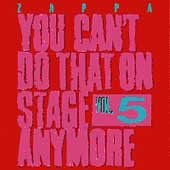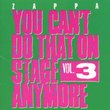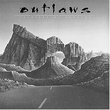| All Artists: Frank Zappa Title: You Can't Do That On Stage Anymore, Vol. 5 Members Wishing: 5 Total Copies: 0 Label: Rykodisc Original Release Date: 1/1/1992 Re-Release Date: 7/10/1992 Album Type: Live Genres: Alternative Rock, Jazz, Special Interest, Rock, Classic Rock, Metal Styles: Jazz Fusion, Comedy & Spoken Word, Experimental Music, Progressive, Progressive Rock, Album-Oriented Rock (AOR) Number of Discs: 2 SwapaCD Credits: 2 UPC: 014431008924 |
Search - Frank Zappa :: You Can't Do That On Stage Anymore, Vol. 5
 | Frank Zappa You Can't Do That On Stage Anymore, Vol. 5 Genres: Alternative Rock, Jazz, Special Interest, Rock, Classic Rock, Metal
|
Larger Image |
CD DetailsSimilar CDs
|
CD ReviewsPeople just don't get it. A Hermit | Southwestern Pa. | 01/29/2006 (5 out of 5 stars) "One thing I see all the time, is when people review volume 5 of "You Can't Do That On Stage Anymore," (or any, for that matter), and think that Zappa's comment in the sleeve notes in the series about the original Mothers' talent, compared to later bands, is supposed to show a lack of ability and talent on the part of the original band. This is glaringly wrong. To parse this quote: 'Great care has been taken throughout to ensure the best audio quality, however early selections of historical interest performed by the original Mothers Of Invention, though not exactly "hi-fi," have been included for the amusement of those fetishists who still believe the only "good" material was performed by that particular group.' This is his gift to fans of the original band. He was aware of a segment of his fan base that still prefers the early material. "Hopefully, comparisons to recordings by the later ensembles will put an end to that particular misconception." This only means that one of his favorite ensembles, the 1982 touring band, is a good contrast to the old material. If he didn't like any of it, there would be as little of it included here as possible. Disc one is a cross section of the early players, not just the performances, but the attitude of that particular band. Jim Black singing on the tour bus like some drunk ready to be thrown out of a bar, is an anthropological recording, a statement of how the guys carried on in those days. Not a spotlight of "talent," but more, what they were about. And FZ's disparaging comments about the original Mothers notwithstanding, they were one of the best bands to perform, in a studio, or on stage. Disc Two, is a cross section of performances by the 1982 band, which, he has said numerous times, played "beautifully." Hearing this disc, is almost like attending a single live performance by this particular band. Pretty representative of a typical early 80's show. Some commercial material ("Dancin' Fool"), extended jams ("A Pound For A Brown"), displays of the bands individual chops ("RDNZL"), and my particular favorite part of the disc, "Geneva Farewell." Some idiot threw something onto the stage, and if you follow Frank Zappa's live performances, even casually, you'll notice he always stressed, "Don't throw stuff onto the stage," this was a common announcement he made from the stage at his shows. So, at this point, he says, "Okay, if you throw anything else onto the stage, the concert's over." You then hear a translator plead to the audience what Zappa said. Then the moron in the audience doesn't take him seriously, and throws something at him anyway. The response? "Houselights! The concert's over." And I hope the people in the audience taught this guy a lesson. I'll review the other volumes of this series as time and circumstance will allow, but I chose this one first, mostly because of what I saw in reviews about the Mothers on Disc 5, and misconceptions about the comments about misconceptions concerning the early band. If this makes any sense. :-) Also: A reference to FZ's solos on "Underground Freak Out...". The guitar solos in question, are Lowell George's. Zappa conducted the band here, like an orchestra." A game of two halves coca-ebola | United Kingdom | 09/06/2003 (4 out of 5 stars) "On Disc 1, the `excerpts and edits' approach doesn't quite work. Items like `Proto-Minimalism' and `Meow' don't really communicate anything when taken out of context; the Mozart Ballet clearly needs to be seen as well as heard; `Baked Bean Boogie' and `Underground Freak-Out' (a King Kong excerpt) only emphasize the fact that Zappa was the worst soloist in his own group at the time; a different edit of `Black Beauty' (aka `No Waiting...') is used to pad out the disc - this, an incomplete `Trouble' with near-inaudible vocals, and a mere snippet of `Little House'/'Hunchback Duke' were not necessary inclusions...and `Where's Our Equipment' (merely three minutes, from the same show as `Ian Underwood Whips It Out') only leaves you gagging for more. On the credit side, Zappa-the-editor manages to make something interesting out of yet another Gas Mask + sex noises routine (`Right There', a variant of `Skweezit'), there are some important obscurities (the terrific `Downtown Talent Scout', `Charles Ives', Lowell's vocal `Here Lies Love' and `Chocolate Halvah'), and even if some of the extracted dialogue/bad-singing-by-JCB is worthless, `German Lunch' is actually funny the first few times you hear it.Having said all that, the deleted `official bootlegs' - `Our Man In Nirvana' and `Electric Aunt Jemima' - are a better way to experience the original Mothers in far out mode. Disc 2 is where the action is - other reviewers have said it all, I'll simply add that this is the only place you can get `Shall We Take Ourselves Seriously'. A disc with the `Easy Meat' (the finished version), `Moggio/What's New In Baltimore', `RDNZL', `Pound...' and `Black Page' recommends itself." 1969-too much talk and 1982-mostly heard before kireviewer | Sunnyvale, Ca United States | 04/26/2002 (4 out of 5 stars) "The first CD is of the Mothers of Invention. The first two tracks are from 1965, and the rest is from 1969. The second CD comes from European concerts during the summer of 1982.
I almost give this 5 stars, but there are a few minor problems.The first CD has a number of fantastic early tracks. There are great solos from a many members of the band. Lowell George has a number of bright moments. Jimmy Carl Black has a few drum solos. It is great to be able to hear these early recordings. There are two problems with the first CD: Intermixed between the songs are tracks where the band is just talking, either on a bus or in a hotel room. It is fun to hear once, but you don't need to hear it again. It interrupts the enjoyment of the music. If the talking must be included, it would have been better stuck at the end of the CD. Also, some of the tracks seem like they were cut short, so there are no long jams.The music on the second CD is extremely good, with some nice jamming. But Zappa has already released tons of recodings from this band. Most of this CD is just slightly different versions of what could be heard elsewhere. Too much of the "You Can't Do That on Stage Anymore" series is devoted to this timeframe. It is a major disappointment with this series of albums that there isn't much from the seventies and nothing from the Jean Luc Ponty or Adrian Belew bands. One of the great things about the Grateful Dead's "So Many Roads" is that all years were covered, and there wasn't any repeats. Everything sounded new and fresh. With each release of the "You Can't Do That On Stage Anymore", I eagerly awaited something that sounded new and fresh when compared to older Zappe recordings. But, there just weren't that many surprises (other than the first CD of this volume).Despite my critisms, this is still a nice CD. Frank Zappa was one the twenty most important artists in the history of rock." |

 Track Listings (25) - Disc #1
Track Listings (25) - Disc #1





